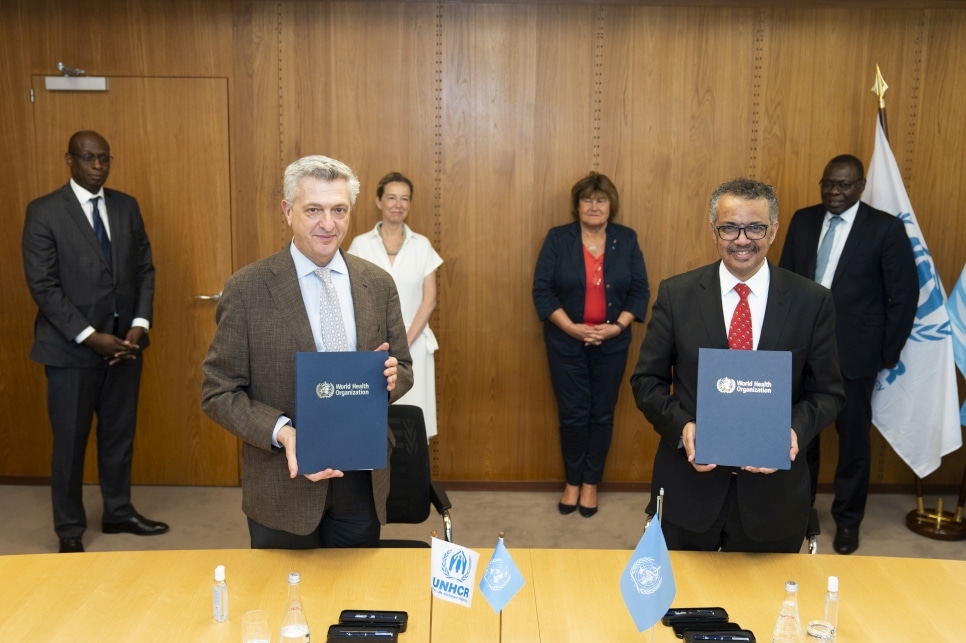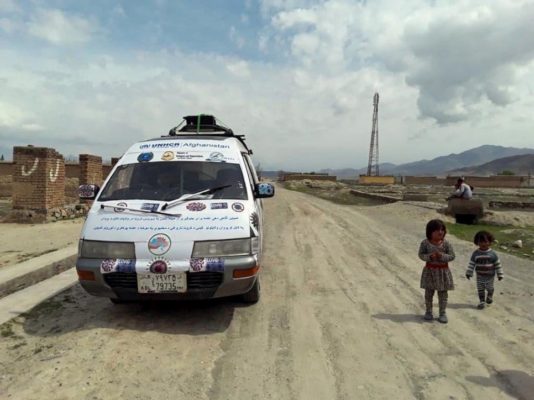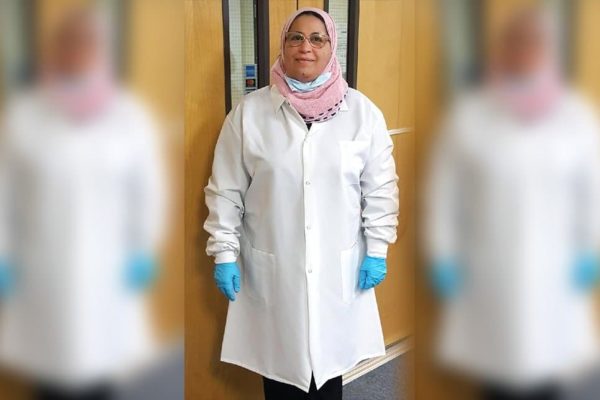
UN High Commissioner for Refugees Filippo Grandi and Director-General, World Health Organization, Dr. Tedros Adhanom Ghebreyesus sign a Memorandum of Understanding focused on the integration of refugees in national health preparedness and response plans globally. © WHO/Christopher Black
The World Health Organization (WHO) and UNHCR, the UN Refugee Agency today signed a new agreement to strengthen and advance public health services for the millions of forcibly displaced people around the world.
The agreement updates and expands an existing 1997 agreement between the two organizations. A key aim this year will be to support ongoing efforts to protect some 70 million forcibly displaced people from COVID-19. Around 26 million of these are refugees, 80 per cent of whom are sheltered in low and middle-income countries with weak health systems. Another 40 million internally displaced people also require assistance.
For more than 20 years, UNHCR and WHO have worked together worldwide to safeguard the health of some of the world’s most vulnerable populations. They have collaborated to provide health services to refugees in every region – from the onset of an emergency and through protracted situations, consistently advocating for the inclusion of refugees and stateless people in the national public health plans of host countries.
Today, the two organizations are working side by side to curb the spread of the COVID-19 pandemic and ensure that forcibly displaced people can access the health services they need, to keep safe from COVID-19 and other health challenges.
“UNHCR’s long-term partnership with WHO is critical to curb the coronavirus pandemic and other emergencies – day in, day out, it is improving and saving lives of millions of people forced to flee their homes,” said UN High Commissioner for Refugees, Filippo Grandi. “Our strengthened partnership will directly benefit refugees, asylum seekers, internally displaced people, and those who are stateless. It leads to better emergency response and will make the best use of the resources of both our two organizations for public health solutions across all our operations globally.”
“The principle of solidarity and the goal of serving vulnerable people underpin the work of both our organizations,” said Dr Tedros Adhanom Ghebreyesus, WHO Director-General. “We stand side by side in our commitment to protect the health of all people who have been forced to leave their homes and to ensure that they can obtain health services when and where they need them. The ongoing pandemic only highlights the vital importance of working together so we can achieve more.”
During Thursday’s signing UNHCR also joined the COVID-19 Solidarity Response Fund. The Fund was launched on 13 March and has so far raised US$214m to date. The Fund, first-of-its-kind, allows individuals, companies, and organizations all over the world to directly contribute to the global response being led by WHO to help countries prevent, detect and respond to COVID-19.
A US$10 million contribution from the Solidarity Response Fund will support UNHCR’s work on urgent needs such as risk communication and community engagement around hygiene practices; provision of hygiene and medical supplies and the establishment of isolation units in countries such as Jordan, Kenya, Lebanon, South Sudan and Uganda. The funds will also support innovative global preparedness activities. “
By joining forces with the Solidarity Response Fund, UNHCR can work together on the ground with WHO to better ensure that the preparedness, prevention and public health response measures to COVID-19 are in place and that much-needed aid can reach refugees, displaced people and their host communities,” said Grandi. END This Press Release is available here For more information on UNHCR’s COVID-19 operations For information about WHO’s COVID-19 operations and work on Refugee and Migrant HealthEND
For more information on UNHCR’s COVID-19 operations
For information about WHO’s COVID-19 operations and work on Refugee and Migrant Health
About the Solidarity Response Fund
The Fund was launched at WHO’s request by the UN Foundation and the Swiss Philanthropy Foundation in mid-March and it is only way for companies and individuals to contribute directly to the work of WHO and partners on the ground, and the fastest way to get resources where they are needed most urgently. More than US$100m from the Fund has already been disbursed, ensuring early vital work in the long fight against the pandemic.
About UNHCR
UNHCR, the UN Refugee Agency, leads international action to protect people forced to flee their homes because of conflict and persecution. We deliver life-saving assistance like shelter, food and water, help safeguard fundamental human rights, and develop solutions that ensure people have a safe place to call home where they can build a better future. We also work to ensure that stateless people are granted a nationality.
UNHCR is taking measures to help respond to the COVID-19 public health emergency and prevent further spread. Working together with governments, UNHCR ensures refugees are included in national health response plans and are well-informed on how to prevent the spread of COVID-19, have access to soap and clean water, and continue to receive the life-saving aid and assistance they need.
About WHO
The World Health Organization provides global leadership in public health within the United Nations system. Founded in 1948, WHO works with 194 Member States, across six regions and from more than 150 offices, to promote health, keep the world safe and serve the vulnerable. Our goal for 2019-2023 is to ensure that a billion more people have universal health coverage, to protect a billion more people from health emergencies, and provide a further billion people with better health and wellbeing.
For updates on COVID-19 and public health advice to protect yourself from coronavirus, visit www.who.int and follow WHO on Twitter, Facebook, Instagram, LinkedIn, TikTok, Pinterest, Snapchat, YouTube.
Media contacts:
WHO
- Christian Lindmeier, lindmeierch@who.int , +41 79 500 6552
- Diane Abad-Vergara, abadvergarad@who.int , +41 79 200 5878
UNHCR
- Andrej Mahecic, mahecic@unhcr.org, +41796429709
- Cécile Pouilly, pouilly@unhcr.org, +41 79 108 2625
Originally published on UNHCR on 21 May 2020





